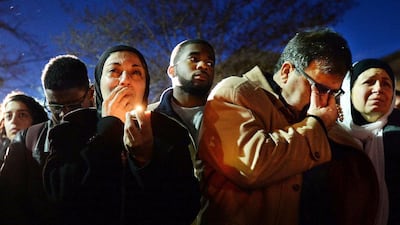NEW YORK // Three American Muslim university students in North Carolina were to be buried on Thursday after being shot dead by a neighbour.
Local police say the crime, committed on Tuesday, appears to be an isolated incident caused by a parking dispute — a claim that has sparked outrage among Muslims and charges of double standards by police and media when it comes to violence against Muslims.
Around two thousand people on Wednesday night attended a vigil at the University of North Carolina campus to remember Deah Barakat, 23 — a dental student — his wife Yusor Mohammad Abu Salha, 21, and her sister, Razan, 19, who were all active in local charity work and also aided Syrian refugees.
A dental clinic in Reyhanli, Turkey, has been named after the slain students, according to the Syrian-American Medical Society, which had been working with Barakat on a project to provide dental services to Syrian war refugees this summer.
Mohammad Abu Salha was set to join her husband, whom she married just six weeks ago, at the UNC dental school in the fall. Her sister was an architecture student at nearby North Carolina State University.
A 46-year-old man who lived in the same campus apartment complex as the newly-wed couple, and described himself on Facebook as a “gun-toting atheist”, Craig Hicks, turned himself in to police on Tuesday and has been charged with three counts of first degree murder.
Police officials said they are continuing to investigate what motivated the shooting, but that their initial finding was that it was triggered by a dispute over a space in the building’s car park. Mr Hicks’ wife also told media that the parking argument is what caused him to murder the students in their apartment.
The claim sparked widespread outrage on social media among Muslim Americans and many others who used the hashtags #MuslimLivesMatter and #WithMuslims to question how an argument over parking could cause the dehumanisation necessary to kill the students.
Mr Hicks had previously criticised religion on his Facebook page, writing in one post, “When it comes to insults, your religion started this, not me. If your religion kept its big mouth shut, so would I.” The post has since been deleted and it is not clear which religion in particular he was referring to.
He also posted a photograph of what he claimed was his pistol.
On social media, many questioned how the murders would have been treated if the religious views of the killer and his victims were reversed.
“If you’re an atheist and think it’s silly to have to condemn this attack because it doesn’t represent you welcome to every Muslim’s reality,” Twitter user @aurosan posted.
Others called for the shootings to be viewed in the context of increasingly visible Islamophobia in the US. “There’s a reason so many people had a visceral reaction to this act & see it through prism of hate crime. A lot has been leading up to this,” journalist Murtaza Hussain tweeted.
Relatives said the victims had recently complained to family members, as well as the apartment complex’s manager, about Mr Hicks’ threatening behaviour, and that they believe the murders were fuelled by a hatred of Muslims.
"It was execution-style, a bullet in every head," the sisters' father, Mohammad Abu-Salha, a psychiatrist, told the Raleigh News and Observer. "This was not a dispute over a parking space; this was a hate crime. This man had picked on my daughter and her husband a couple of times before, and he talked with them with his gun in his belt. And they were uncomfortable with him, but they did not know he would go this far."
He added that his daughter, who like her sister wore hijab, had said Hicks was a “hateful neighbour”. “Honest to God, she said, ‘He hates us for what we are and how we look,’ ” he said.
At a press conference on Wednesday, the Barakat family asked authorities to treat the murders as a hate crime. “It all goes back to justice,” said Deah’s father, Namee Barakat. “We need justice.”
But the family also asked that people remember the students for what they were best known for: their civic involvement, both in the US and the Middle East.
“I came here today in hopes of shining light on Deah’s legacy and Yusor’s and Razan’s,” Barakat’s sister, Suzanne, told CNN. “And for the three of them that has been dedication to service and I want to make sure they are recognised for that and, the world realises what we have lost.”
Barakat, whose family – like that of his wife – were of Palestinian-Syrian origin, had been working with the Syrian-American Medical Society to take dental supplies and volunteer dentists to Syrian refugees in Turkey this summer. Yusor had also volunteered for the society – which runs dental clinics in Turkey, Jordan and inside Syria – last year in Kilis, Turkey, where she shadowed and assisted local dentists at a refugee camp.
Mohammad Nahhas, who runs SAMS’ dental relief programme, said that he last spoke to Barakat last Tuesday. “He had so much passion. He was the kind of person who always wanted to extend a helping hand to others.” Mr Nahhas said, adding that the society had named a clinic in Reyhanli after the trio. “That is for their memory.”
The fund-raising for the summer initiative led by Barakat was at $16,000 last week, but since the murders it has reached $200,000, Mr Nahhas said.
Speaking at the university vigil, Barakat’s older brother, Farris, said that people should find comfort in the knowledge that the three had reached paradise.
“They got to their destination,” he said. “They are home.”
tkhan@thenational.ae

